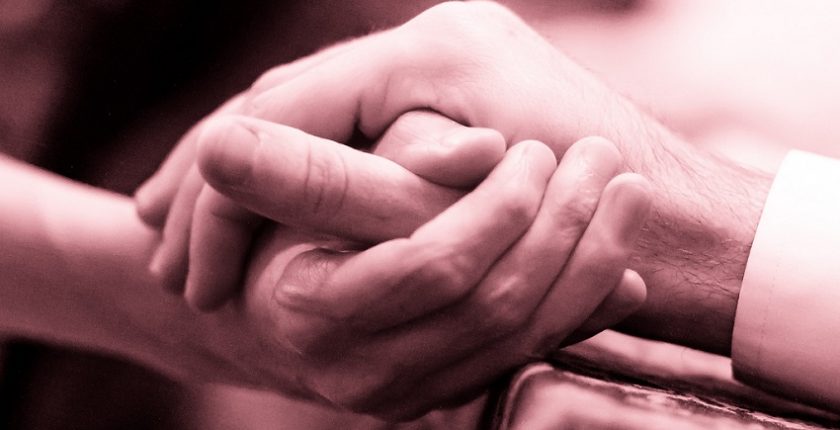Blog
Professor Jim Lucey, Medical Director of St Patrick’s Mental Health Services shares in a new blog post how we can talk to and support those experiencing grief following the death of a family member or friend by suicide.
“The piece below should not increase the pain of suicide, but talking about it can help us to do some essential things: to respect those who have died and to support those who are bereaved and have to carry on.”
Key points from the blog post are below. You can read Professor Lucey’s full blog post here. You can also listen to his interview on Today with Miriam O’Callaghan here.
Suicide bereavement is different
Bereavement through suicide brings with it all the features of acute grief, plus those traumatic features recognised as associated with violent or unexpected death. And, to all of these experiences, bereavement by suicide adds even more. The post-traumatic stress of the survivors is filled with especially painful bewilderment. This is even more so when the suicide is the death of a child.
This is why suicide bereavement is different. The circumstances of a suicide are different from the circumstances of other deaths, and so is the intensity of the emotional and physical reaction to it. Those bereaved by suicide have a greater need to make sense of the death and to understand why the dead made their decision to end their lives. The bereaved question themselves: “why did they take their life?” or “how could I have prevented it?”.
Complicated grief
Very few studies in Ireland have examined the lived experience of those bereaved by suicide. One such small study by Mary Begley and Ethel Quale of University College Cork (UCC) is helpful. They suggest four main themes dominate relatives’ grief experiences after suicide. ‘First, the early months are chequered by attempts to control the impact of the death’. The second theme is an overwhelming need to make sense of the death. The third involves an intense feeling of social unease and finally, hopefully, eventually, there is the rediscovery of the purposefulness of the survivors’ own lives.
Sadly, grief after suicide is more likely to be complicated. Complicated grief lasts longer and interferes more with daily life and functioning. Complicated grief is more likely to be associated with major depression and post-traumatic stress disorder, and those bereaved by suicide are themselves more likely to experience suicidal ideas and even, subsequently, to harm themselves. For this and many other reasons, those bereaved by suicide are more likely to need help either informally or from professionals.
What to say and how to help
It can be difficult for others to know the ‘right’ thing to do or to say. A useful piece from the Harvard Women’s Health Watchputs it well: ‘knowing what to say or how to help after any death is difficult, but don’t let the fear of saying or doing the wrong thing keep you from reaching out to those bereaved by suicide’.
So what should we do or say?
It’s best to stay close to the bereaved. Avoid hollow reassurance. Don’t ask for explanations: don’t offer any either. Try to remember the deceased person’s life. Suicide is not the most important thing about the person who has died.
Acknowledge your uncertainties: follow the lead of the bereaved when broaching sensitive topics. Ask “would it help to talk about what happened?”. Be prepared to listen.
Give help with practical things: run errands; give lifts; mind pets; help with a school run.
Don’t judge. Don’t be afraid to ask directly, “what can I do to help”. Just as you would help the bereaved in any other circumstance, now is the moment to help those bereaved by suicide. There may be other times when it is enough to simply to sit quietly or to pray: whether the bereaved has a faith or not, treat their beliefs with respect.
Most important of all, be there for the long haul. This grief after suicide is not just “a bad flu”; it’s not just going to be over in a few days. There will be times ahead in weeks and months – maybe even years – when the pain is more acute. Birthdays and anniversaries will be harder than before. It’s best to acknowledge these.
As the bereaved return to work and as daily life moves on, it is easy for others to pretend or to forget. Don’t be afraid to bring up the subject. If the bereaved don’t want to talk about it, they will quickly say so.
If you need further support or information, please call St Patrick’s dedicated Support and Information Line on 01 249 33 33
If you need help or just want to talk, supports are available:
- Samaritans 24/7 helpline: 116 123 or jo@samartians.org
- Pieta House: 1 800 247 247 or mary@pieta.ie, or contact your nearest Pieta House
- Teen-Line Ireland: 1 800 833 634 (for ages 13 to 19)
- Childline: 1 800 66 66 66 (for under 18s)

